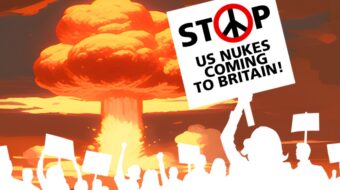North Korea signaled recently that it was ready to end its nuclear testing and return to anti-nuclear talks. Still, the U.S. and South Korea were hardly moved, and anything resembling normal state-to-state relations on the peninsula seems far off.
Though eclipsed in recent months by other world happenings, notably the Arab Spring and the international economic crisis, the peninsula remains volatile, with the states on both sides of the DMZ trading threats and barbs. As such, any move towards de-escalation of tensions has been met with relief by parties involved.
Kim Jong Il, the North Korean leader, said in an Aug. 24 meeting with Russian President Dimitry Medvedev he was ready for a nuclear moratorium and a return to the six-party talks between the North and South, the U.S., Japan, China and Russia.
Kim’s trip to Russia has generated buzz, as he infrequently travels abroad. Still, not many are expecting a big diplomatic breakthrough. South Korean and U.S. officials have been wary of taking Kim’s announcement particularly seriously. While it is a “welcome first step,” said U.S. State Department spokesperson Victoria Nuland in a State Department press briefing, it was not enough “to resume the six-party talks.”
Nuland continued that the statement was simply a reiteration of the North’s position over the past few years, and went on to cite a disclosure by North Korea of a previously secret uranium enrichment program in November 2010. This has been running for years alongside the well-known plutonium enrichment operation, the basis for Pyongyang’s 2006 and 2009 nuclear tests. The uranium enrichment has been feared by the U.S. and others a second path towards the acquisition of nuclear weapons by the north.
“As you know, their disclosure last November of uranium enrichment facilities remains a matter of serious concern to us, and these activities are a clear violation of their obligations under U.N. Security Council Resolutions,” Nuland said, referring UNSC Resolution 1718, which condemned the nuclear test and imposed sanctions on the north, as well as called for an immediate resumption of the six-party talks.
The statements by Kim and the U.S. are the latest in a back-and-forth cycle between North Korea and other nations dating back years: The North accuses the U.S. of attempting to “stifle” its development, pointing back to the Korean War, the lingering presence of U.S. military personnel in the South and nuclear weapons some believe the U.S. has secreted in South Korea. In turn, it makes provocative statements, and sometimes backs them up with action, such as the nuclear tests. The U.S. and South Korea then respond harshly as well, a crisis is reached and barely averted as the two sides make some sort of deal, usually in the form of economic benefits for the North in exchange for a scaling back of its nuclear program.
In order to normalize the situation long term, most agree that the Korean War, which was never ended with a peace treaty, but only an armistice agreement, needs to be officially ended. Complicating matters has been a demand by the North that it be allowed to sign a peace treaty with the U.S. directly – not South Korea or the UN. The U.S. counters that this is impossible, given that the war was fought between UN forces and North Korea’s military. Behind the North’s demand is the belief that the UN was, at the time, simply a fig leaf for U.S. aggression.
Now, analysts say, some form of peace is even further off than had been the case through 2001. While it is widely perceived that the North simply uses its nuclear program as a bargaining chip designed to extract concessions and aid from the U.S. and Japan, Pyongyang argues that, after it was labeled part of an “axis of evil” by the Bush administration – one member of which was invaded by the U.S. in the Iraq War – it needs nuclear weapons as a “deterrent.” As the U.S. says it cannot sign a peace treaty and North Korea will not agree to peace negotiations with the “puppet” South or the UN, it is hard to see how the situation will be normalized anytime soon.
Meanwhile, Russia’s President Medvedev, writes Fyodor Lukyanov, a columnist for Russia’s state-run RIA-Novosti press agency, seems to be trying his own version of peace making – which would also economically benefit Moscow. Russia has long wanted a pipeline to sell its natural gas in South Korea, but such a line must go through the North. It is likely that this is the main reason for Kim’s meeting with the Russian president.
Were the pipeline to become a reality, North Korea would gain some leverage internationally: Just like the Ukraine and Belarus, it would have the power to interfere with Russia’s profits and another nations’ natural gas supply by tampering with the pipeline. This would, perhaps, make the regime feel less susceptible to outside pressure, and therefore more likely to give up its nuclear weapons. It would also allow the North to generate tens of millions of dollars in gas transit fees.
In the meantime, however, the standoff continues.
Photo: The U.S. Army // CC 2.0












Comments